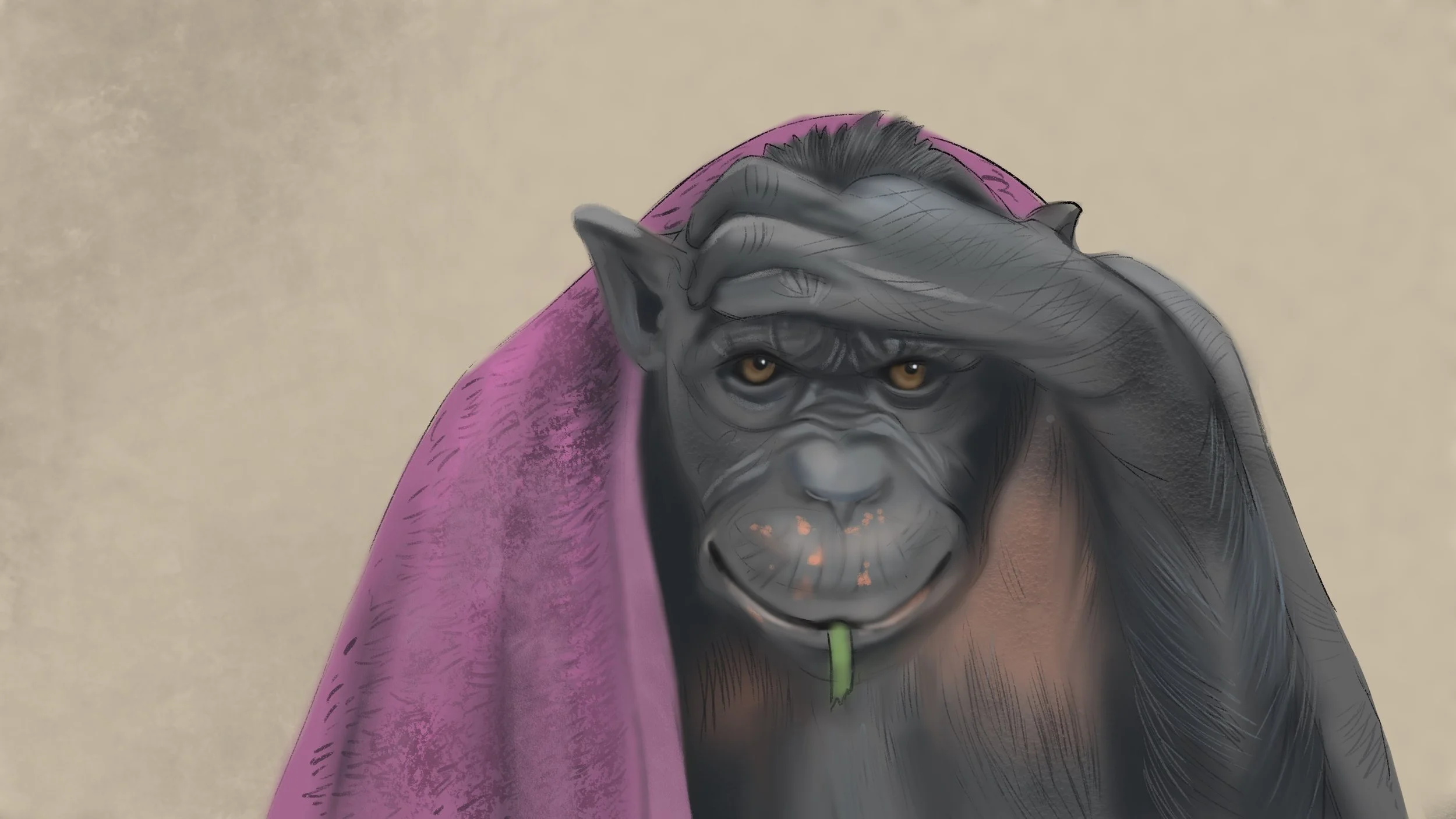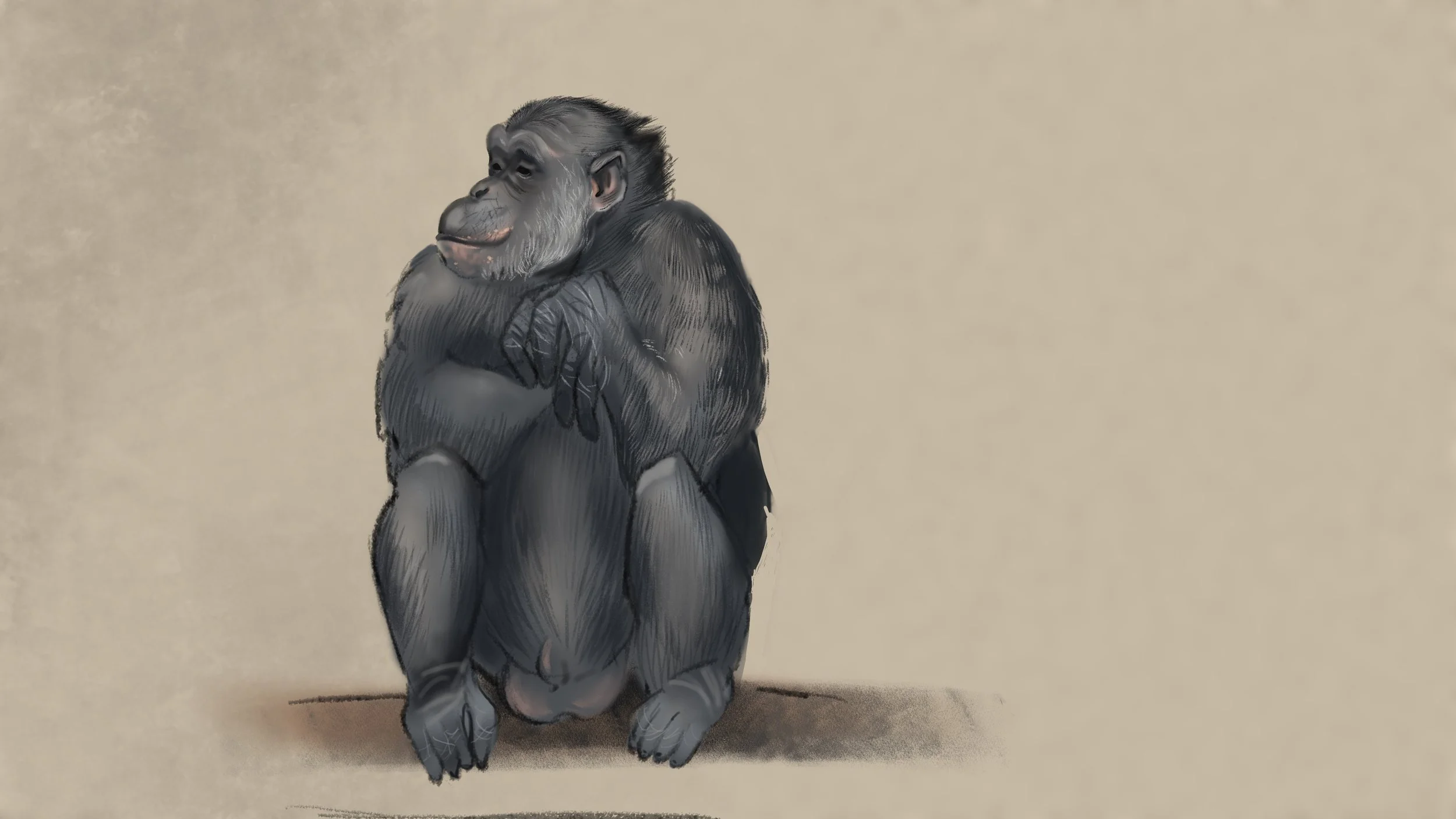
Chimpanzee Conservation
Presented by Artist, Ananya Ramesh
Closest Living Relatives: Chimpanzees
“We have similar features; when we look at them, our gaze is reciprocated. They are so aware of their surroundings. They are sentient—so clever—yet they go through so much: traded as pets, confined to a cage, displayed in unnatural environments for entertainment. Chimpanzees deserve better.”- Ananya Ramesh
WHY ARE CHIMPANZEES IMPORTANT?
Chimpanzees (and bonobos) are our closest living relatives. They are remarkable primates, with expressive faces, cognitive abilities, and complex social structures. They stand out as intelligent sentient beings. They are known to use tools, vocalize to communicate and display behaviors similar to humans, making them fascinating to learn about.
Chimpanzees belong to the great ape family. They are primarily found in the forests and savannas of Central and West Africa. These apes are an important part of their ecosystem. They help in seed dispersal, contribute to forest regeneration, and maintain ecological balance
Ronnie the chimpanzee at Wales Ape & Monkey Sanctuary, by Ananya Ramesh
WHAT ARE THE CHALLENGES FACING CHIMPANZEES?
Chimpanzees face numerous threats that threaten their survival:
Habitat Loss
Deforestation due to tree felling, agricultural practices, and infrastructure development is a major threat to chimpanzees. As forests are cleared, chimpanzees lose their homes, leading to population decline and fragmentation.
Illegal Hunting and Trade
Hunting for bushmeat and the illegal pet trade are critical threats. Chimpanzees are often targeted for their meat, which is a delicacy in some cultures. Additionally, young chimpanzees are captured and sold as pets, and their parents are killed in the process. This disrupts their social structures and threatens populations. Many chimpanzees are also sadly used in entertainment. Chimpanzees are wild animals and physically more powerful than humans. Once they reach a certain age in captivity, they start exhibiting stress-induced behaviors and are transferred to sanctuaries. As they live out the rest of their lives in sanctuaries, they carry habits they are taught as babies, such as wrapping themselves in blankets and using bottles and spoons.
Disease
Chimpanzees are vulnerable to many diseases, particularly those transmitted by humans. Outbreaks can have devastating impacts on their populations.
Nakima the chimpanzee at Wales Ape & Monkey Sanctuary, by Ananya Ramesh
WHAT CAN WE DO TO HELP?
Study Chimpanzees
Learning about chimpanzees is a step towards their conservation. Many online resources and documentaries provide insights into their lives and the challenges they face. Some excellent starting points include:
Jane Goodall Institute, https://www.janegoodall.org
World Wildlife Fund, https://www.worldwildlife.org/species/chimpanzees
Documentaries like "Chimpanzee" by Disneynature or "Jane" about the life of Jane Goodall.
International Union for the Conservation of Nature: Chimpanzees
Celebrate Chimpanzees
Engage your community through education.
Host events, screenings, or discussions about chimpanzee conservation.
Use social media platforms to share information and promote awareness. Report reels and posts on social media that show chimpanzees in entertainment as unacceptable.
Create your own works of art/writing about chimpanzees and their conservation and share them with the world. Use #creatureconserve hashtags when posting them online.
Protect Chimpanzees
Volunteer in conservation initiatives. Organizations like the Jane Goodall Institute offer programs where you can contribute to research and conservation efforts. Participating in these initiatives helps protect habitats and promote awareness.
Support sustainable products and companies that practice ethical sourcing to protect chimpanzee habitats. Choose products that are certified as eco-friendly or contribute to conservation efforts.
Donate to conservation organizations and sanctuaries. Your contributions can help fund critical research, habitat protection, and community education programs. A few sanctuaries you may want to support include:
https://ngambaisland.org/
Chimpanzees are not just important for their role in ecosystems; they also offer invaluable insights into our own species. By taking action to protect them, we ensure a future where both chimpanzees and humans can thrive together.
Fergus the chimpanzee at Wales Ape & Monkey Sanctuary, by Ananya Ramesh
Text and Artworks by Ananya Ramesh



